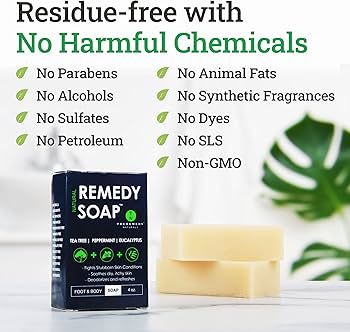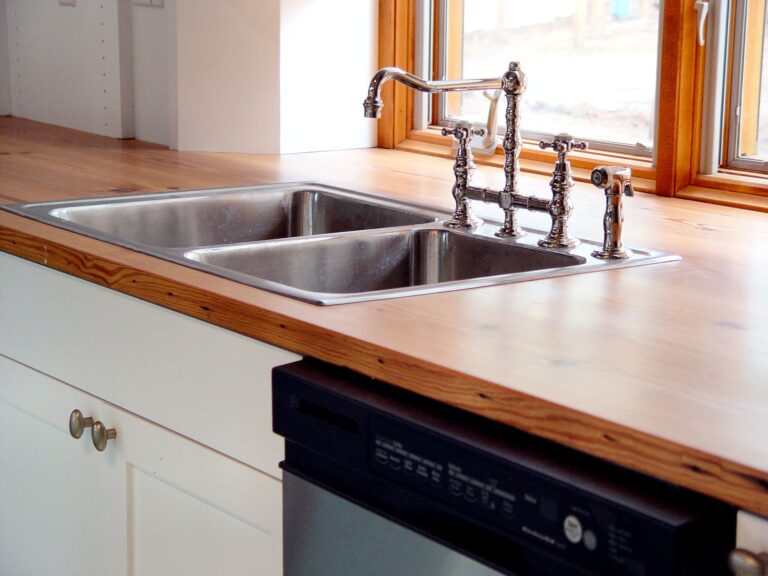Can Orange Cpvc Glue Be Used to Glue Pvc: Expert Insights
No, orange CPVC glue cannot be used to glue PVC. These materials require different adhesives.
Using the wrong glue can cause weak joints and potential leaks. Wondering why orange CPVC glue can’t be used on PVC? It’s all about the chemistry. CPVC and PVC are different types of plastic with unique properties. Each type needs a specific adhesive to ensure a strong bond.
Using the right glue is essential for a durable and leak-proof connection. In this post, we’ll explore the differences between CPVC and PVC, the importance of using the correct glue, and the potential risks of mixing them up. Stay tuned to learn how to make the best choice for your plumbing needs.
Introduction To Cpvc And Pvc
When it comes to plumbing, two common materials you will encounter are CPVC and PVC. Each has its unique properties and uses, and it’s essential to understand these differences, especially when considering adhesives like orange CPVC glue. Let’s take a closer look at what CPVC and PVC are, their characteristics, and how they differ.
What Is Cpvc?
CPVC stands for Chlorinated Polyvinyl Chloride. It’s a thermoplastic produced by chlorinating PVC resin, giving it enhanced temperature resistance. This makes CPVC an excellent choice for hot water pipes. It can handle temperatures up to 200°F (93°C), which is higher than PVC’s capacity.
- Temperature Resistance: Up to 200°F (93°C)
- Common Uses: Hot water supply lines, industrial liquid handling
- Color: Typically light gray or off-white
So, if you’ve ever wondered why your hot water system works so efficiently, you might owe it to CPVC pipes!
What Is Pvc?
PVC, or Polyvinyl Chloride, is another type of thermoplastic but without the added chlorine. It’s widely used in a variety of applications due to its durability and affordability. However, PVC is more commonly used for cold water systems and not suitable for high-temperature applications.
- Temperature Resistance: Up to 140°F (60°C)
- Common Uses: Cold water pipes, drainage systems, electrical cable insulation
- Color: Typically white or dark gray
Think of PVC as the workhorse of plumbing for non-heated systems. It’s everywhere, from your garden hose to the drainage pipes under your sink.
Understanding these materials is crucial when working on plumbing projects, especially when considering the type of adhesive to use. The question remains: Can you use orange CPVC glue on PVC? We’ll dive deeper into this topic in the next sections. Stay tuned!
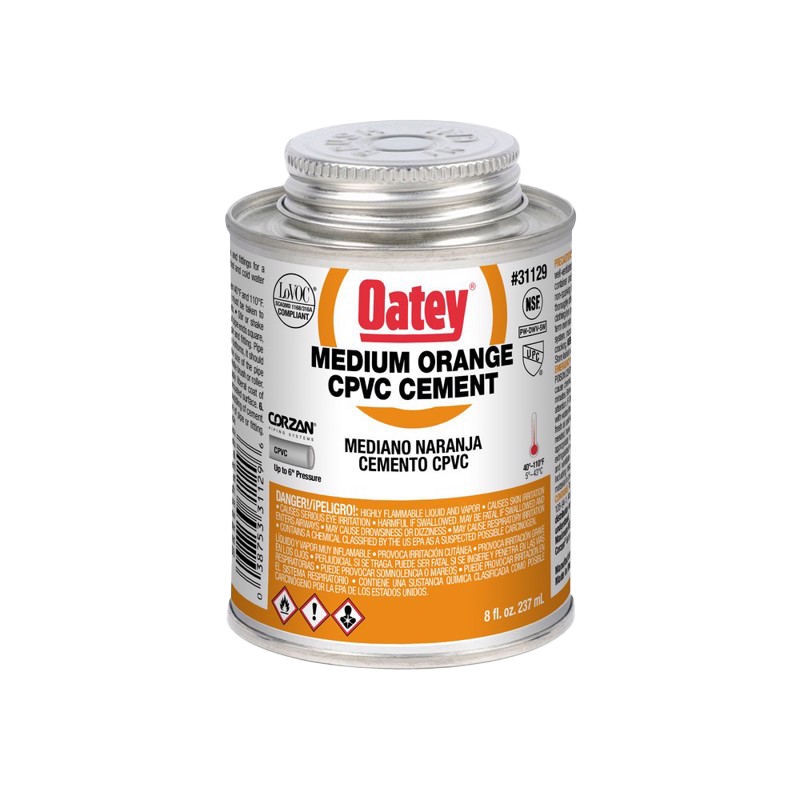
Credit: www.oatey.com
Types Of Adhesives For Cpvc And Pvc
When it comes to plumbing, the choice of adhesive can make or break your project. If you’ve ever wondered if you can use orange CPVC glue for PVC, you’re not alone. Understanding the types of adhesives for CPVC and PVC is crucial. Let’s dive into the specifics.
Cpvc Glue
CPVC glue, often identified by its orange color, is specially formulated for Chlorinated Polyvinyl Chloride (CPVC) pipes. This type of glue can withstand higher temperatures and is typically used for hot water lines. Here are some key points:
- Temperature Resistance: Can handle up to 200°F (93°C).
- Application: Suitable for hot and cold water systems.
- Curing Time: Usually requires 15-20 minutes to set, and 24 hours to cure fully.
CPVC glue is your go-to for high-temperature applications. But, does it work for PVC? Hold that thought, and let’s explore PVC glue first.
Pvc Glue
PVC glue, typically clear or blue, is specifically designed for Polyvinyl Chloride (PVC) pipes. It’s ideal for cold water lines and drainage systems. Here’s what you need to know:
- Temperature Resistance: Handles up to 140°F (60°C).
- Application: Ideal for cold water and drain, waste, vent (DWV) systems.
- Curing Time: Sets in 10-15 minutes, with full cure in 24 hours.
While PVC glue is perfect for lower temperatures, it’s not designed for high-heat scenarios. So, using the right glue for the right pipe is essential for a secure fit.
Now, to the million-dollar question. Can you use orange CPVC glue on PVC? Technically, you can, but it’s not recommended. Here’s why:
- Compatibility: CPVC glue is designed for the specific chemical properties of CPVC pipes. Using it on PVC might not yield a strong bond.
- Temperature: CPVC glue’s higher temperature resistance isn’t necessary for PVC applications and might be overkill.
- Cost: CPVC glue is often more expensive than PVC glue, making it less economical.
In essence, while CPVC glue can bond PVC pipes, it’s like using a sledgehammer to crack a nut – unnecessary and not the best tool for the job. Stick to the right adhesive for each type of pipe to ensure a durable and reliable connection.
Differences Between Cpvc And Pvc Glue
Are you confused about whether you can use Orange CPVC glue for PVC pipes? It’s a common question! To make an informed decision, it’s essential to understand the differences between CPVC and PVC glue. In this section, we’ll delve into the chemical composition and application methods of both types of glue. Let’s get started!
Chemical Composition
First things first, let’s talk about what’s inside the glue. The chemical composition of CPVC and PVC glues is different. CPVC glue is designed to work with Chlorinated Polyvinyl Chloride (CPVC) pipes. It contains special solvents that can handle higher temperatures. On the other hand, PVC glue is made for Polyvinyl Chloride (PVC) pipes and doesn’t have the same heat resistance.
- CPVC Glue: Contains additional chlorination, making it suitable for hot water applications.
- PVC Glue: Lacks the extra chlorination, making it ideal for cold water applications.
In short, the glue’s chemical makeup is tailored to the type of pipe it’s meant to join. Mixing these glues could lead to weak joints and potential leaks. Yikes!
Application Methods
Now, let’s discuss how to use these glues. The application methods for CPVC and PVC glues are quite similar but remember, precision is key!
- Clean the Pipe: Always clean the pipe ends before applying the glue. Use a clean cloth and pipe cleaner.
- Apply Primer: For both types of pipes, use primer before the glue. This helps the glue to set better.
- Spread the Glue: Apply an even layer of glue around the pipe and inside the fitting. Be quick but careful.
- Join the Pipes: Push the pipe and fitting together. Hold them in place for a few seconds to ensure a strong bond.
While the steps are similar, always use the right glue for the right pipe to avoid complications. If you’re unsure, remember the saying: “When in doubt, don’t glue it out!”
To sum up, understanding the differences between CPVC and PVC glue is crucial for making the right choice. By knowing their chemical composition and application methods, you can ensure a secure and lasting bond. Happy plumbing!
Compatibility Of Orange Cpvc Glue With Pvc
When it comes to plumbing, the question of compatibility between different materials is crucial. One common query is whether Orange CPVC glue can be used to glue PVC pipes. To answer this, we need to delve into some essential aspects, such as chemical reactions and the overall strength and durability of the bond created. Let’s explore these details to understand if Orange CPVC glue is a viable option for PVC.
Chemical Reactions
Understanding the chemical reactions between Orange CPVC glue and PVC is key. CPVC glue is specially formulated for Chlorinated Polyvinyl Chloride (CPVC) materials. It works by slightly melting the surfaces of the CPVC pipes and fittings, creating a strong bond as it hardens. But what happens when you use it on PVC?
| Material | Reaction with CPVC Glue |
|---|---|
| CPVC | Strong, lasting bond |
| PVC | Weaker bond, potential chemical incompatibility |
Using CPVC glue on PVC can result in a weaker bond. The chemical makeup of PVC and CPVC is different, which means the glue might not melt PVC surfaces as effectively. This can lead to leaks or failures in the plumbing system.
Strength And Durability
When it comes to plumbing, strength and durability are non-negotiable. You wouldn’t want your pipes to fall apart after a few months, right? Let’s consider these factors when using Orange CPVC glue on PVC.
- CPVC Bond: Designed for high temperatures and pressure, perfect for hot water lines.
- PVC Bond: Typically used for cold water lines and drainage.
The strength of the bond is significantly influenced by the material compatibility. Using CPVC glue on PVC might not provide the durable connection you need. Imagine this scenario: You’ve just installed a new plumbing system, and a few weeks later, you notice a small leak. Frustrating, isn’t it? This is a likely outcome when using the wrong type of glue.
- Ensure you use the correct glue for the material.
- Check the manufacturer’s instructions.
- Consider the application – hot water lines need CPVC, cold water lines use PVC.
In summary, while Orange CPVC glue may stick to PVC, it’s not the best choice for a strong, durable bond. Stick to PVC glue for your PVC pipes to ensure a leak-free, long-lasting plumbing system. After all, using the right tools and materials is half the battle won.
Expert Opinions On Using Cpvc Glue For Pvc
Many people ask if they can use orange CPVC glue to join PVC pipes. The answer depends on who you ask. Experts have different opinions on this topic.
Plumbing Professionals
Plumbers often prefer to use the right glue for each material. They say that CPVC glue is designed for CPVC pipes. Using it for PVC pipes may not give a strong bond. Some plumbers have tried it and found leaks over time. Others say it can work in a pinch, but it is not ideal for long-term use.
Manufacturers’ Recommendations
Manufacturers also have clear guidelines. They usually recommend using PVC glue for PVC pipes. The formulas of CPVC and PVC glues are different. CPVC glue can join PVC pipes, but it may not last as long. Manufacturers stress using the correct glue for the best results.
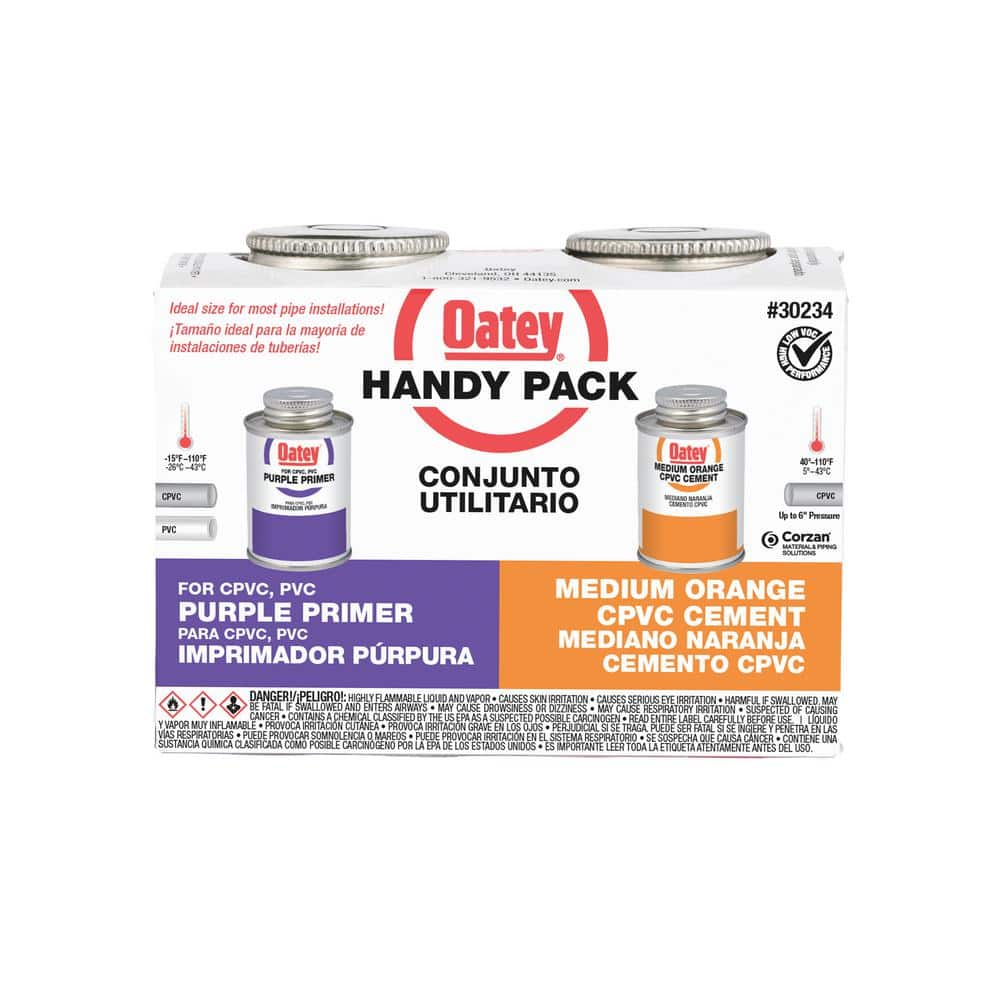
Credit: www.homedepot.com
Potential Risks And Issues
Using the correct type of glue is crucial in plumbing. Many people wonder if orange CPVC glue can be used to glue PVC pipes. While it might seem convenient, this practice comes with potential risks and issues.
Material Degradation
Orange CPVC glue is designed for CPVC pipes, which handle higher temperatures. Using it on PVC pipes can lead to material degradation. PVC and CPVC have different chemical compositions. The glue may cause PVC to weaken over time. This can result in leaks and costly repairs.
Joint Failures
CPVC glue creates a strong bond with CPVC pipes. Using it on PVC pipes can lead to joint failures. The glue does not properly adhere to PVC. This can cause the joints to fail under pressure. Leaks may develop, leading to water damage and other issues.
Best Practices For Adhesive Use
Using the right adhesive for your plumbing projects is crucial. Many people wonder if orange CPVC glue can be used on PVC. To achieve the best results, follow these best practices for adhesive use.
Preparation And Cleaning
Start by preparing the surfaces. Clean the PVC pipes thoroughly. Dirt and grease can weaken the bond. Use a clean rag to wipe the surfaces. For better results, apply a PVC cleaner. It removes oils and residues. Let the surfaces dry completely before moving on.
Application Techniques
Apply the adhesive evenly. Use a brush for this. Coat both surfaces that need joining. Make sure the adhesive covers the entire area. Press the pipes together firmly. Hold them in place for a few seconds. This ensures a strong bond. Wipe away any excess glue immediately. It can weaken the bond if left to dry.
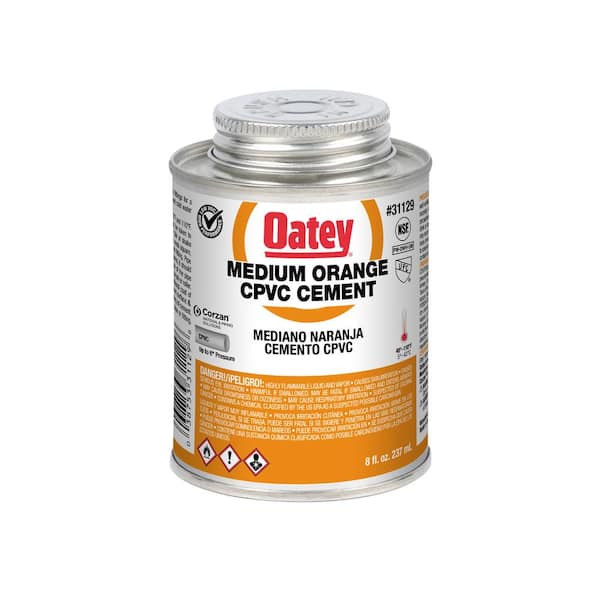
Credit: www.homedepot.com
Alternatives To Using Cpvc Glue On Pvc
When it comes to plumbing projects, using the right adhesive is crucial for ensuring that your pipes stay leak-free and secure. You might be wondering if orange CPVC glue can be used on PVC pipes. While they might seem similar, using the wrong glue can lead to problems down the line. Fortunately, there are several alternatives to using CPVC glue on PVC that can save you a lot of headaches. Let’s dive into some of these options.
Appropriate Pvc Adhesives
First and foremost, if you’re working with PVC pipes, it’s important to use adhesives specifically designed for PVC. PVC cement is the go-to choice for this job. It’s formulated to create a strong bond between PVC surfaces, ensuring a watertight seal. Here’s a simple guide to using PVC cement:
- Clean the surfaces: Use a clean cloth to wipe away any dirt or debris from the ends of the pipes.
- Apply primer: PVC primer is often used to prepare the surface for the cement. It softens the PVC to ensure a stronger bond.
- Apply the cement: Spread a thin layer of PVC cement on both the pipe and the fitting.
- Join the parts: Push the pipe into the fitting and give it a slight twist to distribute the cement evenly.
- Hold and set: Hold the joint together for about 30 seconds to ensure a good bond, then let it cure for the recommended time.
Using PVC cement is straightforward and effective, making it the best choice for PVC projects.
Mechanical Fasteners
Another alternative to using CPVC glue on PVC is using mechanical fasteners. This method is particularly useful for projects where you might need to disassemble or adjust the pipes later on. Mechanical fasteners include:
- Compression fittings: These fittings use a compression ring to create a seal and are easy to install and remove.
- Threaded fittings: Threaded PVC fittings can be screwed together and unscrewed as needed. Make sure to use Teflon tape on the threads to ensure a leak-free connection.
- Clamp fittings: These fittings use a clamp mechanism to secure the pipes together. They’re often used in temporary setups or in situations where glue isn’t ideal.
While mechanical fasteners might not provide the same permanent seal as adhesives, they offer flexibility and ease of installation. They’re a great option for projects that require frequent adjustments or maintenance.
In conclusion, while using orange CPVC glue on PVC might seem like a quick fix, it’s important to choose the right adhesive for the job. PVC cement and mechanical fasteners are reliable alternatives that can ensure your plumbing projects are successful. Remember, using the right materials can save you time and trouble in the long run.
Frequently Asked Questions
Will Orange Cpvc Glue Work On Pvc?
Orange CPVC glue is not recommended for PVC. Use PVC-specific glue for best results and a secure bond.
What Happens If I Use Cpvc Glue On Pvc?
Using CPVC glue on PVC can weaken joints and lead to leaks. Always use the correct glue for each material.
Can I Use Oatey Cpvc Glue On Pvc?
No, you cannot use Oatey CPVC glue on PVC. Use glue specifically designed for PVC pipes.
Is There A Difference Between Pvc Glue And Cpvc Glue?
Yes, there is a difference. PVC glue is for PVC pipes, while CPVC glue is for CPVC pipes. Use the correct glue for each material.
Conclusion
Orange CPVC glue is not suitable for PVC. Using the right glue is crucial. CPVC and PVC have different chemical properties. Mixing them can cause leaks. Always check the label before purchasing. Use PVC glue for PVC pipes. Your plumbing will thank you.
Simple steps can prevent future headaches. Proper materials ensure long-lasting results. So, stick with the right glue. Your pipes will work better.

My name is Maria, A professional merge game player with years of experience mastering games like Merge Dragons, Merge Gardens, Merge Mansion, and more. My passion for uncovering the best strategies, solving tricky puzzles, and discovering hidden secrets led her to create MergeGameplay.com.



